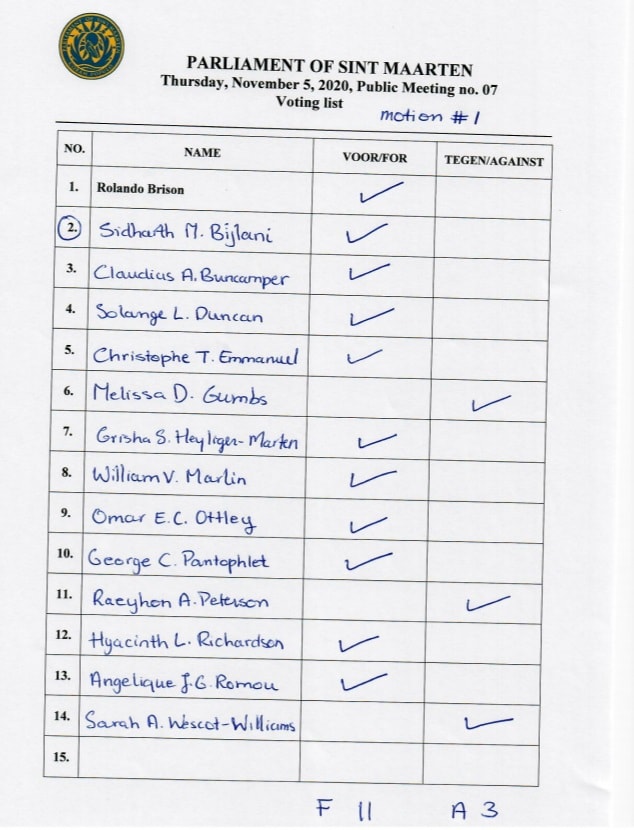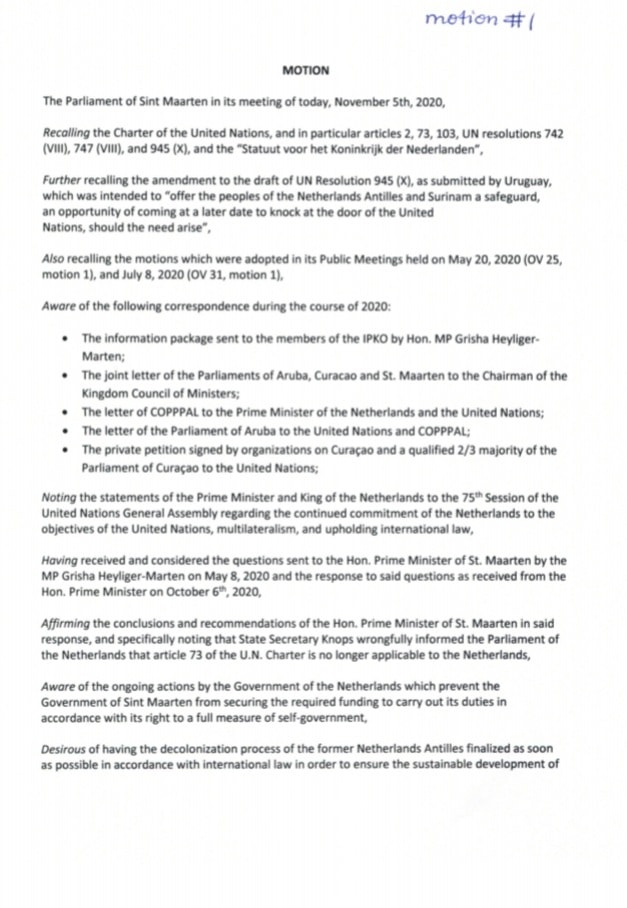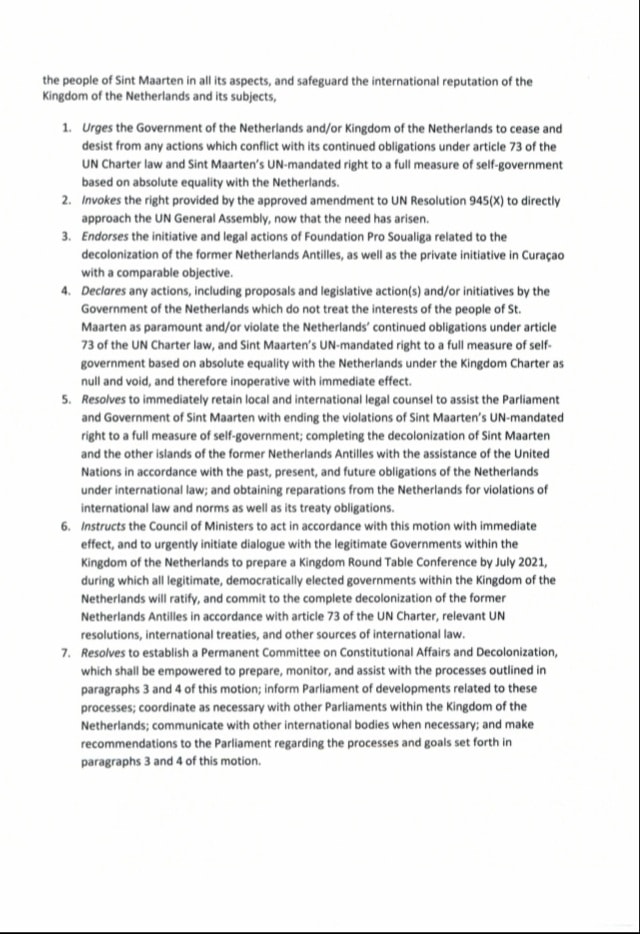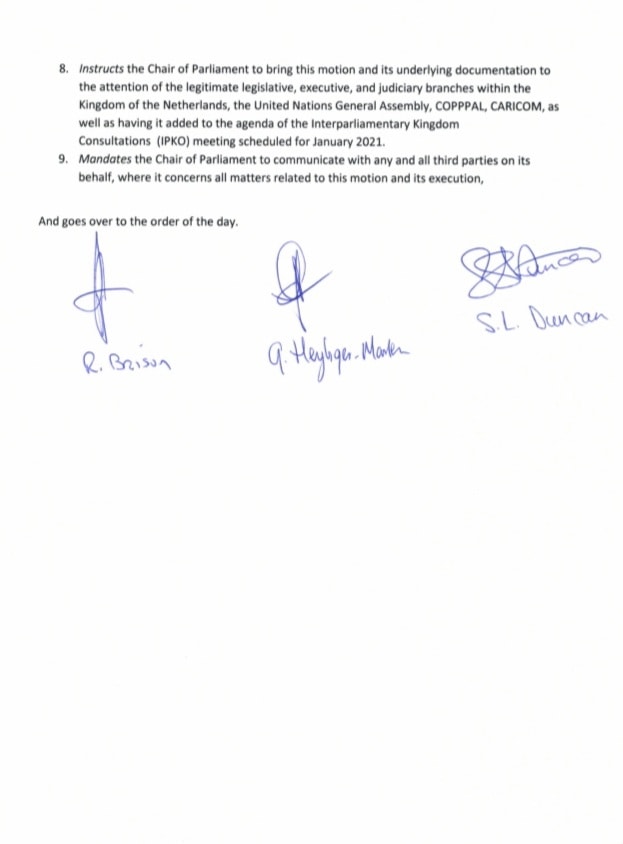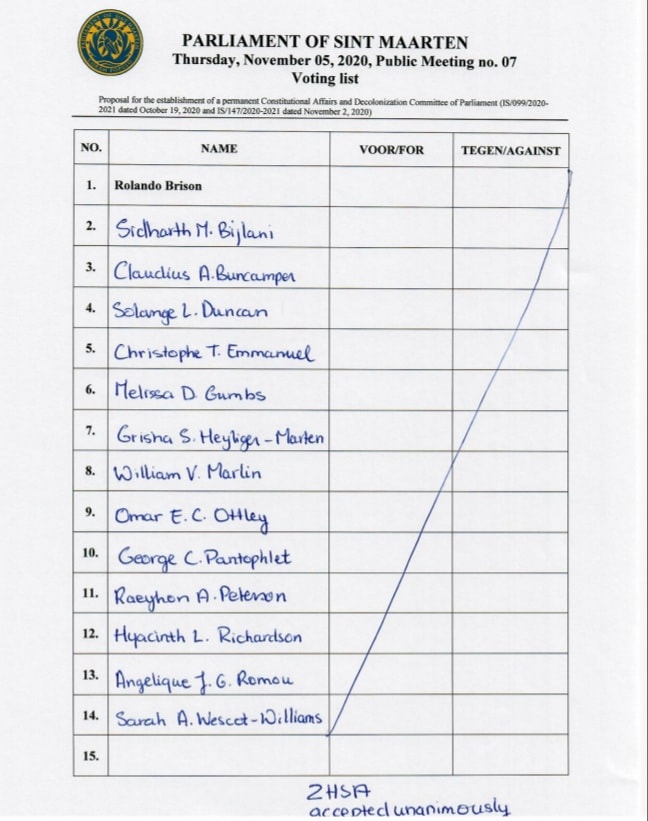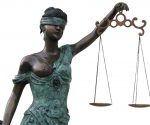A waste of time, energy and money
 By Hilbert Haar
By Hilbert Haar
The spin doctors in Parliament, spearheaded by UP faction leader Grisha Heyliger-Marten are going all out in their attempt to sell their story about the decolonization process. So far, twelve parliamentarians fell for it – not only the representatives of the UP and the NA, but also their allies of the USp. Only MPs Wescot-Williams (UD) and Melissa Gumbs and Raeyhon Peterson kept a clear head and recognized the decolonization-drive for what it really is: a sneaky attempt to divert the public’s attention from the real problems St. Maarten is facing.
On November 5, the parliament approved a motion to establish a permanent parliamentary committee with 12 votes and favor and those of Wescot-Williams, Gumbs and Peterson against. Initially that committee would be called the decolonization committee, but after objections from Wescot-Williams, parliament “grudgingly” (as Wescot-Williams noted in a press statement) agreed to rename it as Committee for Constitutional Affairs and Decolonization.
Initiator Grisha Heyliger celebrated in a press statement that the committee was established by a unanimous vote and that it was, in her opinion, “a firm declaration that they will make use of their right to self-determination to achieve a full measure of self-government.”
Heyliger furthermore claims that there is no need to go back to the people and that the committee and the motion are based on the same point of departure, namely that the decolonization of the Netherlands Antilles (and by extension, that of St. Maarten) was never completed.
Steven Hillebrink, who works at the Constitutional Affairs and Legislation Department of the Ministry of Home Affairs and Kingdom Relations in The Hague, notes in an article published in the Rozenburg Quarterly magazine that the United Nations resolution 945 of 1955 confirms, in the opinion of the Netherlands, that the decolonization of the Netherlands Antilles has been completed.
This position finds support in a ruling by the Court in First Instance of October 2019 in the case of Statia’s Clyde Van Putten c.s. vs. the Netherlands that also applies to St. Maarten: “Non-self-governing territories can be said to have reached a full measure of self-governance through free association with an independent state.”
The court ruled that Statia, as part of the Netherlands Antilles, reached its full measure of self-governance in 1954 when the Kingdom Charter was established. “It is a fact that the population of Statia, as part of the Netherlands Antilles, has exercised its right to self-determination during the establishment of the Kingdom Charter. It has freely chosen not to become an independent state but to become part of the legal order within the Kingdom, as established in the Kingdom Charter.”
But that court ruling has not convinced Heyliger and her political allies. While more recently the court declared an attempt by the obscure Pro Soualiga Foundation to have the Kingdom Charter declared null and void inadmissible, the motion pushed through Parliament endorses the foundation’s baseless initiative.
MP Wescot-Williams has labeled the coalition’s attempt to put St. Maarten back on the UN-list of non self-governing countries as “a fast ball.” She also noted, correctly, that St. Maarten already has the right of self-determination and that changes in the country’s constitutional future must be based on a decision by the people. The notion that the UN charter could force the Netherlands “to take care of us,” the MP stated in a press release, is no more than “a carrot.”
She furthermore stated that it is “criminal” to tie the hands of the government with the motion.
And why would that be? The motion urges the government of the Netherlands and/or the Kingdom to cease and desist from actions that conflict with “its continued obligations under article 73” of the UN Charter. According to Heyliger, State Secretary Knops has “wrongfully told the Dutch Parliament that article 73 no longer applies to the Netherlands.”
Gumbs and Peterson, the parliamentarians that represent the Party for Progress in parliament, note in a press statement that “most sensible thinking nations focus on economic recovery and social wellbeing and that organizing a round table conference with the Netherlands (as the motion stipulates) will take “serious time and attention.” In other words: there are more urgent matters to deal with than decolonization.
Endorsing the legal action against the government by the Pro Soualiga Foundation is like betting on a dead horse,” Peterson observed.
The cherry on the cake is of course this statement by Melissa Gumbs: the Parliament does not have a mandate to complete the decolonization process. It only has a mandate to act within the current constitutional status.
And there is yet another argument against the senseless pursuit of decolonization. Principle VII of the UN’s General Assembly Resolution 1541 of 1960 states that free association (St. Maarten’s current status within the Kingdom) may be considered as a form of full self-government if the population retains the right to change its political status at a future date.”
On the other hand, Hillebrink notes in Rozenburg Quarterly that the UN “only approved decolonization schemes under resolution 1541 that guaranteed complete internal autonomy.”
One could of course argue that St. Maarten does not have complete internal autonomy, because of the financial supervision by the Cft. But in its eagerness to obtain country status, St. Maarten’s politicians freely agreed with this form of control by the Kingdom.
The motion contains yet another oddity: it resolves to declare null and void any actions (and even proposals) by the government of the Netherlands “that do not treat the interest of the people of St. Maarten as paramount.”
It seems to me that St. Maarten’s parliament, nor its government, is in any position to tell the Dutch government what to do and what not to do. And besides, what is really in the best interest of the people who live here?
The motion furthermore resolves to hire attorneys to help parliament and government in their quest for self-government and decolonization. It also instructs the Council of Ministers to initiate talks about a round table conference with the Netherlands. What the motion fails to mention is that, according to the draft agreement with the Washington-based Peter Choharis Law Group, the objective is also to have the Netherlands sign an agreement about paying reparations “for damages resulting from the colonial and post-colonial era.” To be signed – wait for it – by July 2021 – about eight months from now.
I don’t know about you, readers, but I recognize a mission impossible when I see one. What a bloody waste of time, energy and money.
###
Related articles:
Parliament hops on the de-colonization bandwagon
PFP says: Motion Another Example of Coalition Confusion
Parliament torpedoes its own committee before it even gets to work
MP Heyliger-Marten clarifies Parliament’s approach towards decolonization












